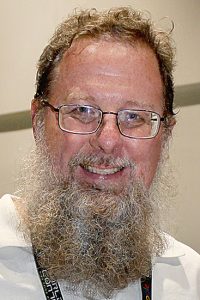Betsy Wollheim: Alpha Daughter

ELIZABETH ROSALIND WOLLHEIM was born December 5, 1951 in New York, the daughter of legendary editor Donald A. Wollheim and Elsie B. Wollheim, and was closely involved with professional SF from an early age.
She attended Beloit College in Wisconsin in 1969, then transferred to Clark University in Massachusetts. She studied English at Clark while simultaneously studying art at the Worcester Art Museum School. After graduation in 1973 she lived in Cambridge for two years and attended grad school in photography before taking jobs as a proofreader and darkroom technician for two magazine printing houses. She spent a few months in Mexico studying anthropology, but in 1975 returned to New York as associate editor at DAW Books, which her father founded in 1971. In 1985, when her father’s health began to fail, she took over as president of DAW, which she still runs, with Sheila Gilbert.
Wollheim has edited many major SF and fantasy writers, including C.J. Cherryh, Mercedes Lackey, Patrick Rothfuss, Nnedi Okorafor, Kristen Britain, Saladin A. Ahmed, C.S. Friedman, and Tad Williams. In 2012 she was the first woman editor to win a Hugo Award for Best Professional Editor, Long Form. Her other honors include a World Fantasy Award for lifetime achievement in 2018, and a Skylark Award for contributions to SF in 2020. She and Sheila Gilbert have been nominated for eight Chesley Awards for their art direction, and won in 1990 and 1992.
Wollheim met musician Peter Stampfel in 1975, and they married in 1982. They have two grown children, and live in New York City.
Excerpt from the Interview:
“During the 17 years I lived with my mother and father, I was the only child, so at the dinner table every night, I heard about publishing. I started hearing about publishing very, very young, and I remember, for example, the time the phone rang in my parents’ bedroom at two o’ clock in the morning and it was Andre Norton. Only Andre would have dared to call my father at two a.m., but he was so patient with her. My father was a complicated, often difficult man, and many people were intimidated by him. I’m actually involved in a documentary film about a group my father was part of that he never shared with the science fiction and fantasy community. It’s going to be shot in October in the Catskills by French award-winning documentarian Sebastien Lifshitz. There is also one non-fiction book my father wrote about this group, and the pseudonym my father used for just that one book is not currently known, but I hope in future to correct that.
“My father was incredibly important in the genre, but because of his prickly personality, he didn’t get the recognition he deserved. He felt that recognition should be on a pure meritocratic basis, which is ideal, but of course doesn’t happen in our field, nor in any other. That’s just the way it is – popularity wins out. When he was a guest of honor at the New Orleans Worldcon, the committee actually came up to him and said they were going to give him a committee Hugo Award. They had the ability to do that. But instead they decided to give it to the science fiction oral history society. It was a particularly cruel thing to tell my dad that they had considered giving him a Hugo, but had decided against it. Two months later my father had a stroke, and that was basically the end of his life. The con com could have given him a Hugo and chose not to. I’m on the Hugo committee now to try to fight for the continuation of the editorial Hugos. There are people who believe editors don’t deserve Hugos. I have been on the committee for a couple of years.
“I can go on the record at Locus saying that I tried to persuade publishers to put the editor’s name on the copyright page. Nothing ostentatious–just a single line on the copyright page. DAW does it, and Tor does it for the editors who want to be named – I guess some of them don’t, and that’s their choice. Tor and DAW are the only ones that currently do it. I proposed including the editors’ names on the copyright page, but none of the big houses were willing to do it. One major publisher considered it and had a meeting about it but decided for some reason I no longer remember that they would not do it. I wrote to one editor here in New York, and got a response from the company’s London office saying that they didn’t believe editors deserved Hugos, and that we should get industry awards instead. What industry awards?
“There have been enormous changes at DAW since we took over in 1985. Sheila and I have changed the entire face of the company, 180 degrees – originally DAW was like a pulpy hold-over from the ‘60s. This isn’t hard to understand, if you know my dad’s history. Before he founded Ace Books and spent nearly twenty years as the editor in chief, my father was the only paperback editor of Avon for many of the years between 1943 and 1951. While at Avon, he edited the Avon Fantasy Reader and also did a lot of editing on his own time. He edited the Viking Portable Novels of Science, which was the first hardcover reprint anthology, and The Girl with the Hungry Eyes, the very first original science fiction anthology. Of course, everybody knows The Pocket Book of Science-Fiction, published in 1943, the first book that ever had the words ‘science fiction’ in the title. My father started from a very old-fashioned place, and changed a lot over the years. He was com-municating with Lovecraft in 1935 – I still have those Lovecraft letters. Even though Lovecraft is frowned upon these days for being racist in a racist era, I treasure them – my dad was only 21 when he corresponded with Lovecraft.
“Honestly, there are many huge names in our industry who have questionable back¬grounds. Hugo Gernsback didn’t pay his authors, yet this is the man we honor with our greatest award. When Jeannette Ng stood at that podium and said John W. Campbell was a fascist, I was thrilled. Jeannette, if you’re reading this, that was exactly what my father said for years. I loved hearing it. I wish somebody would ‘out’ Hugo Gernsback for not paying his authors. My father sued him for nonpayment of his first story in 1938, and he gathered together a group of science fiction writers – back in those days, there weren’t very many – who also weren’t paid. My father was a very litigious man, even in his youth. He sued Gernsback for himself and ten other authors for nonpayment, and won the princely sum of $75. Then he wrote another story under a pseudonym, and Gernsback bought it and once again didn’t pay. There’s another really nasty aspect of how Gernsback ran his business. He was paying himself a $100,000 salary, and we’re talking in the 1940s. He was making enormous amounts of money for that era and stiffing many if not most of his authors. This is the man we honor with our greatest award, but I don’t see the Hugo being renamed. I don’t think that’s going to happen. It’s kind of a shame.
Interview design by Stephen H. Segal.
Read the full interview in the November 2021 issue of Locus.
 While you are here, please take a moment to support Locus with a one-time or recurring donation. We rely on reader donations to keep the magazine and site going, and would like to keep the site paywall free, but WE NEED YOUR FINANCIAL SUPPORT to continue quality coverage of the science fiction and fantasy field.
While you are here, please take a moment to support Locus with a one-time or recurring donation. We rely on reader donations to keep the magazine and site going, and would like to keep the site paywall free, but WE NEED YOUR FINANCIAL SUPPORT to continue quality coverage of the science fiction and fantasy field.
©Locus Magazine. Copyrighted material may not be republished without permission of LSFF.







Slamming Gernsback while uplifting a man who directly pirated Tolkien? Give me a break.
No one is perfect, past or present, so stop with the cancel-culture crap, geesh.